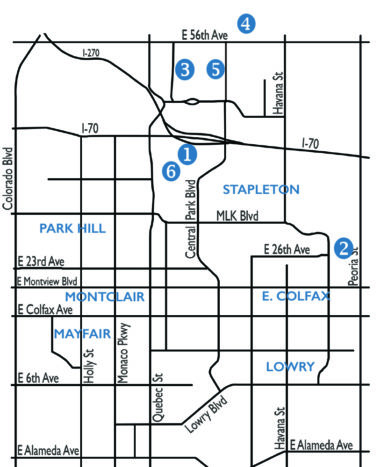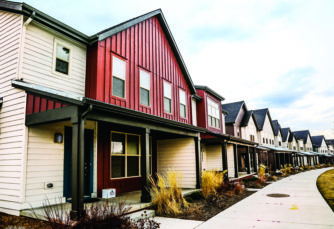 1) Why do we still have A Line train horns?
1) Why do we still have A Line train horns?
Readers have asked about the resurgence of train horns on the A Line. RTD says since the system is new, they are continually looking at how they can further refine it—and they have been making improvements on some of the gates. While work is being done, horns will be sounded and attendants may return to the crossings.
The quiet zones were approved when the A Line trains reached a level of consistency in the Positive Train Control (PTC) system that met FRA standards. When the trains are operating under the new, wireless Positive Train Control (PTC) system, sounding horns is not required. The system is the first in the country to be built into a commuter rail system from the ground up, however, and is continually being monitored and improved. When the train is not operating under the PTC system—if the wireless technology does not initialize, for example—a backup train protection system, Automatic Train Control (ATC), is used to ensure that the train reaches a crossing with the proper timing of the gates. Horns are required to be sounded at crossings when trains use ATC. As the PTC system continues to be refined, the trains will be using it more consistently, and ATC (with horns) will be used less frequently.
Horns are sounded under the following circumstances:
If there is an issue with the timing of a crossing gate. A train will sound its horn as required, four times, through the crossing.
When workers are on or near the tracks.
When pedestrian or vehicle traffic could affect train travel through a crossing.
Anytime it is believed that an emergency situation exits or has the potential to exist.
When a train uses Automatic Train Control instead of Positive Train Control.
Click to read RTD’s quiet zone fact sheet.

A Hampton Inn and Home 2 Suites by Hilton, with opening planned for July 2020, will share a lot at 25th and Peoria in Aurora.
2) New Stapleton Hotel on Peoria
Hampton Inn and Home 2 Suites by Hilton have partnered in a single project at E. 25th St. and Peoria in Aurora as part of the Stapleton-Aurora development. The five-story building will have 108 Hampton Inn rooms and 112 Home 2 rooms. The two hotels will have separate check-in areas. Amenities will include a heated pool, a business center, a fitness center and complimentary breakfast. Construction by Hawkeye Hotels is expected to start in May and opening is expected in July 2020.
The building is set back from Peoria, just west of an adjoining lot that fronts on Peoria. Future use of that lot, which has been deeded to Aurora Urban Renewal is unknown.
3) How does proposed drilling legislation differ from the current law?
Northeast Denver residents were taken by surprise in January 2018 when they learned the State Land Board (SLB) was considering the sale of mineral rights under land in North Stapleton, which would have given oil and gas operators the right to drill there (frontporchne.com/article/oil-gas-drilling-come-stapleton/). In that case, the City of Denver was taken by surprise also, since they hadn’t been monitoring the SLB’s agenda. Since then, many local communities have become very much aware that the state has the authority and the mandate to maximize the mineral rights it owns to produce revenue that benefits the state’s schools.
The state legislature is currently considering Senate Bill 19-191 to change the focus of the law. As of March 22, the bill had been passed in the State Senate and was working it’s way through the required House committees.
The current law states that it is in the public interest to “foster” the development of oil and gas resources in a manner “consistent” with the protection of public health, safety, and welfare, including protection of the environment and wildlife resources. The proposed law states that the public interest is to “regulate” oil and gas development to “protect” those values.
Currently the SLB is composed of three members with substantial experience in the oil/gas industry and one with experience in environmental or wildlife protection. Under the proposed law, the State Land Board would have nine members: one from the oil/gas industry and all of the following areas would be represented: environmental protection, wildlife protection, soil conservation and public health, along with an agricultural producer.
Currently, an operator first gets a permit from the SLB to drill in a defined area, then notifies the applicable local government of the proposed development and seeks any necessary local government approval. Under the proposed law, before operators could get a permit from the SLB, they would first have to apply to the local government for approval of the proposed oil location and bring the disposition of that application to the SLB; or bring proof that the affected local government does not regulate the siting of oil and gas locations.
This summary of the proposed changes was taken from the state legislature’s summary of the bill. For more information, see the full summary and the bill at https://leg.colorado.gov/bills/sb19-181.
4) New Preschool Planned for North Stapleton

A Primrose preschool at 59th Ave. and Elmira Ct. is in the planning stages, with a hoped for opening in the fall of 2020.
A 12,165 square foot Primrose preschool is being planned for the southeast corner of Elmira Court and 59th Ave. It will have 11 classrooms to serve preschool children, but the rooms will be certified by the state for use as after-school care for children up to 5th grade. Most of the landscaping will be along Elmira; the south side of the building faces open space. The red brick, little school house appearance is similar to the other Primrose School at 25th and Syracuse. The land will not be purchased until summer, with permits gained by end of year—all in hopes of opening the fall of 2020.

Affordable homes on Central Park Blvd in North Stapleton built by Thrive.
5) Affordable Housing Update
Last month we described a “new wrinkle” in the affordable housing program; Stapleton affordable homes builder Gene Myers from Thrive said numerous buyers with contracts for his homes were being told they didn’t qualify under the city’s program. If that continued it would leave him with unsold homes and unable to continue building. Chief Housing Officer Britta Fisher this month explained that a City of Denver audit last summer had revealed that the program’s rules say a buyer’s housing expenses shouldn’t exceed 30% of their income—and that rule wasn’t being consistently enforced. In response to the audit, they tightened up enforcement with that rule. When community concerns arose, the program considered the arguments pro and con and a decision was made to raise the housing ratio to 35%. They are also working on a plan for an exemption process whereby buyers with a ratio over 35% can be referred to housing counseling partners for a housing counseling session and review and recommendation.
Fisher acknowledged that another concern has been that the City’s process for verifying income and eligibility to buy a home in the program happens at the end of the process—after buyers already have a contract on a home. She said stakeholders are working together to identify changes to make the program operate more efficiently, and they are looking at ways to verify income earlier in the process.
6) Cajun Seafood Coming to Quebec Square
Hook and Reel Seafood restaurant’s website has a long list of upcoming locations—and one of them is 7406 E. 36th Ave., the old Country Buffet restaurant location in Quebec Square. We’ve been unable to connect with the restaurant directly, but BusinessDen.com said they are coming in June. Their menu features clams, crab, lobster, mussels, shrimp and crawfish with one of their house sauces cooked mild, spicy or “fire.”



Any news on when MLK will go through to Peoria?